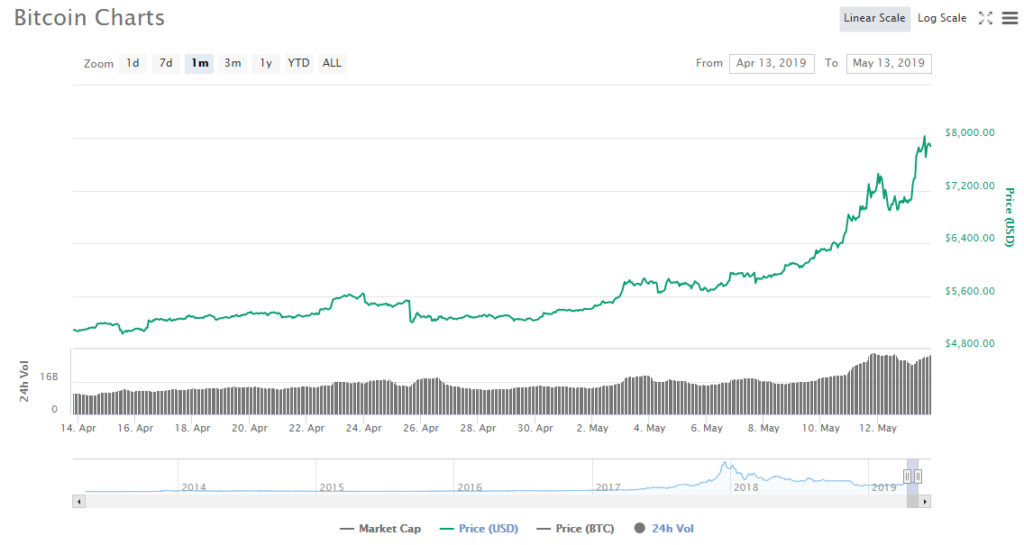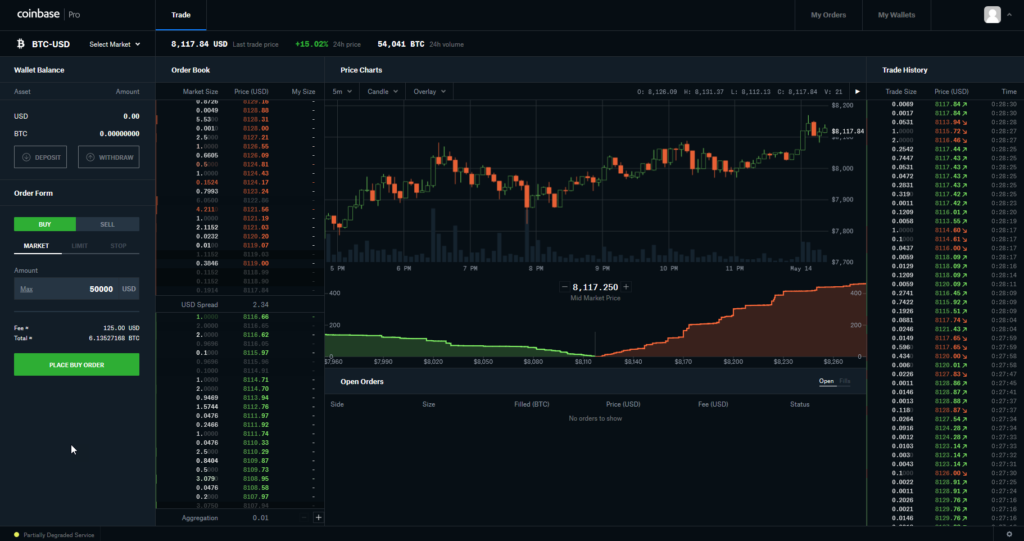Once again the stock market was down bigly on the ongoing trade war headlines.
One of the few asset classes that has not crapped the bed recently is cryptocurrencies, which have rallied hard over the past couple weeks.

Are cryptocurrency investors betting on financial conditions getting so bad the Fed has to cut rates?
Why would Bitcoin be treated like gold or longer dated treasuries while art prices were collapsing along with stocks?
Is it one of the few safe asset classes during turbulent times? Or is there another liquidity issue at a major exchange causing them to go all-in on a pump-n-dump to mask their losses? Bidding up an existing coin might have less legal risk than launching another ICO.
When almost nothing is real, it isn’t hard to move the markets.
“Ninety five percent of spot bitcoin trading volume is faked by unregulated exchanges, according to a study from Bitwise this week. The firm analyzed the top 81 crypto exchanges by volume on industry site CoinMarketCap.com. They report an aggregated $6 billion in average daily bitcoin volume. The study finds that only $273 million of that is legitimate.”
Cryptocurrencies are hacking targets and are still widely used for money laundering, plus a variety of other financial crimes
“Crypto Capital worked with organizations associated with financial crime, money laundering and securities fraud—and major crypto exchanges too.”
They might also have actual real world uses soon.
You can use Bitcoin at Whole Foods, Microsoft launched a decentralized identity tool based on blockchain, Amazon offers a managed blockchain service & Facebook is building a mainstream cryptocurrency.
Facebook aims to burrow more deeply into the lives of its users. It is building a type of checkout option that consumers could use on other websites, some of the people said. Similar to how a Facebook profile can be used to log into hundreds of websites (including The Wall Street Journal), Facebook envisions allowing those credentials to be selected as a payment method when users buy goods online. … One idea under discussion is Facebook paying users fractions of a coin when they view ads, interact with other content or shop on its platform—not unlike loyalty points accrued at retailers, some of the people said. … It is also working to tie online purchases more closely to ads.”
The idea of using cryptocurrencies for regular day to day purchases is still for the most part unrealistic unless they have that sort of loyalty program incentive bonus integrated with them.
Stable coins typically do not change in price much, though some of those are not even fully backed by fiat currencies:
“As of the date [April 30] I am signing this affidavit, Tether has cash and cash equivalents (short term securities) on hand totaling approximately $2.1 billion, representing approximately 74 percent of the current outstanding tethers.”
Even if stable coins become more integrated then they still run up into all the costs associated with regulation & KYC laws while also eating legal bills tied to lawsuits.
Volatility is the main reason people invest in & believe in cryptocurrencies.
The transaction fees are more than a bit overwhelming. E-trade may soon offer cryptocurrency trading, but they’d mostly appeal to daytraders & daytraders would need much tighter spreads than what something like Coinbase offers.
The following shows why cryptocurrencies are utterly horrible in terms of transaction costs. As of about an hour ago Coinbase would buy a Bitcoin for $7,993.35 though they would also charge a $119.10 fee, driving that buy price down to $7,874.25. The same service would sell a Bitcoin for $8,073.37, with an additional bonus fee of $120.29, bringing the cost to $8,193.66.
If you average together the buy & sell price it comes to $8,033.96, with a $319.41 spread. That means if you invest $8,000 at a time, you are getting clipped for a 1.99% spread in each direction each time you trade.
| Buy | Sell | Spread | Midpoint | Spread % | |
| default | $7,993.35 | $8,073.37 | $80.02 | $8,033.36 | 1.00% |
| fee | $119.10 | $120.29 | $119.70 avg | ||
| after fee | $7,874.25 | $8,193.66 | $319.41 | $8,033.96 | 3.98% |
How much more ridiculous do those fees get if you are dealing in smaller sums? Do they go from 2% in each direction to 5%? And what convenience do they provide over cash that offsets the massive conversion fees & the headache of dealing with the accounting of gains and losses on all those FX transactions.
Yuck.
The spreads are much better if you use Coinbase Pro. For a similar transaction fee you could put through a $50,000 transaction & the spread outside of that fee is frequently only a dollar or two.

I am a bit surprised they haven’t damaged their brand with what a rip off their core platform is relative to the rates available on their pro subdomain. Even so, the PRO user interface would probably overwhelm most people who’ve never traded financial instruments.
A person who was willing to hold a small amount of inventory could probably run a decent arbitrage business creating something like the core Coinbase site while buying & selling off the PRO subdomain.
Price up. Volume up.
Though the critical question remains: is any of it real?
